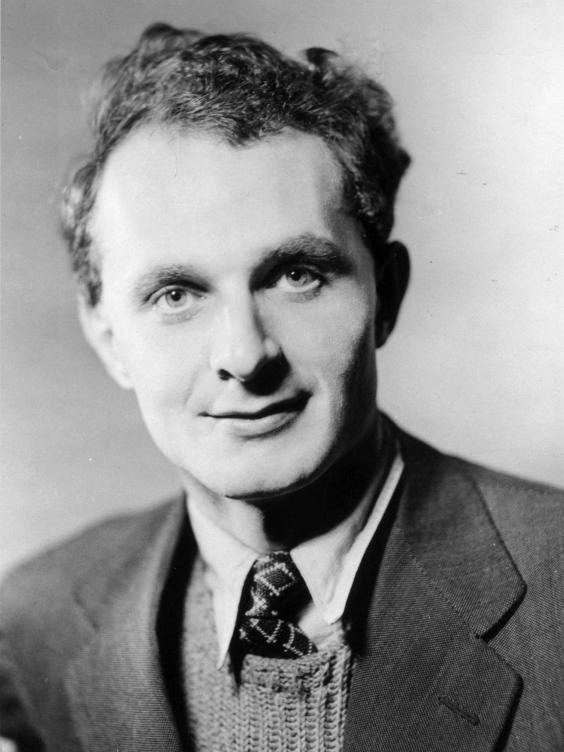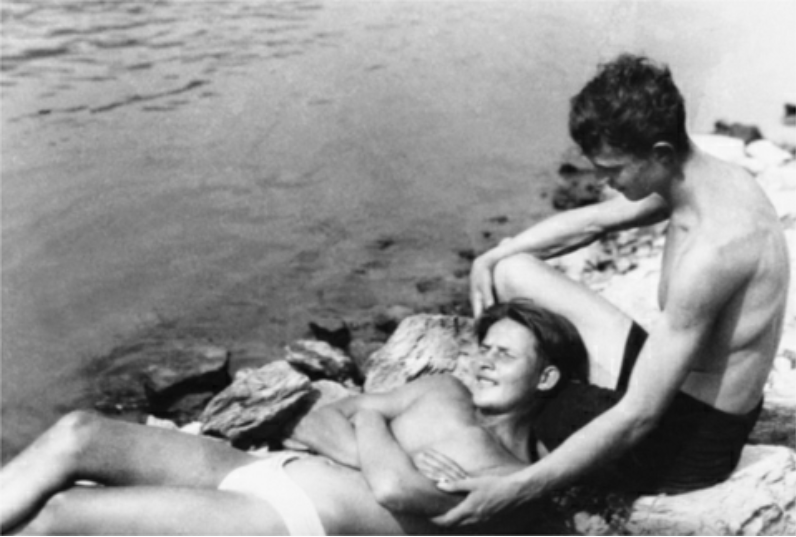

Queer Places:
Greshams School, Cromer Rd, Holt NR25 6EA, Regno Unito
University of Oxford, Oxford, Oxfordshire OX1 3PA
University College School, 11 Holly Hill, London NW3 6QN, Regno Unito
15 Loudoun Rd, London NW8 0LS, Regno Unito
St Mary on Paddington Green, 1LG, St Mary's Square, London W2, Regno Unito
 Sir Stephen Harold Spender
CBE (28 February 1909 – 16 July 1995) was an English poet, novelist, and
essayist who concentrated on themes of social injustice and the class struggle
in his work. He was appointed
Poet Laureate Consultant in Poetry to the
United States Library of Congress in 1965.
Sir Stephen Harold Spender
CBE (28 February 1909 – 16 July 1995) was an English poet, novelist, and
essayist who concentrated on themes of social injustice and the class struggle
in his work. He was appointed
Poet Laureate Consultant in Poetry to the
United States Library of Congress in 1965.
In a letter to Roger Senhouse (27 December 1930), Lytton Strachey reported that Spender ‘Thinks of living in Germany with a German boy, but hasn’t yet found a German boy to live with.’
In the 1930s Dwight Ripley kept a residence in London, and with his partner Rupert Barneby mixed in circles that included Dwight's fellow Oxonians W.H. Auden and Stephen Spender, as well as Christopher Isherwood, the Huxleys, the Sitwells, Cyril Connolly and his American wife, Jean Connolly: circles in which the admired standards were for satire in literature and, in society, sarcasm and wit. Jean Connolly, who became one of Dwight's closer friends, was at the center of avant-garde sets on both sides of the Atlantic; she was the only woman, said Auden, who could keep him up all night.
In 1933, Spender fell in love with Tony Hyndman, and they lived together during 1935–1936.[19] In 1934, Spender had an affair with Muriel Gardiner. In a letter to Christopher Isherwood in September 1934 he said: "I find boys much more attractive, in fact I am rather more than usually susceptible, but actually I find the actual sexual act with women more satisfactory, more terrible, more disgusting, and, in fact, more everything."[19] In 1936, shortly after the end of his relationship with Tony Hyndman, Spender fell in love with and married Agnes Maria Pearn (known as Inez Pearn). This marriage broke down in 1939.[19] In 1941, Spender married Natasha Litvin, a concert pianist. This marriage lasted until his death. Their daughter Lizzie is married to the Australian actor and comedian Barry Humphries, and their son Matthew Spender is married to the daughter of the Armenian artist Arshile Gorky.

Stephen Spender by David Hockney

Stephen Spender (right) and friend, embodying Freundschaft: photographed by
Herbert List, Germany, 1929
In 1940, during the autumn height of the Blitz, Stephen Spender published an open letter to Christopher Isherwood in the New Statesman. "You can't escape," wrote Spender. "If you try to do so, you are simply putting the clock back for yourself: using your freedom of movement to enable yourself to live still in pre-Munich England." Isherwood, who left long before the Blitz, was annoyed. So was Dwight Ripley. "It takes in all of us refugees," he complained to Rupert Barneby, while implying that there was more than politics at issue. "I shall always think of the Spenders henceforth as Delight and Inez, How bitter they are, and no wonder." Earlier, Spender in fact urged Isherwood to emigrate to America in search of refuge for his German lover, Heinz Neddermeyer. In Dwight's circle of friends, Brian Howard likewise had a German lover, Toni Altmann. After Hitler was named chancellor, Isherwood spent the next four years, Howard the next seven, each contending with a sucession of revoked visas, expired passports, and sudden deportations in their continuing efforts to find asylum or new citizenship for Neddermeyer and Altmann, respectively, and so prevent their eventual repatriation and arrest in Germany. Both Englishmen tried to get their lovers into England, and both were refused on moral grounds. Erika Mann married W.H. Auden and became a British subject overnight. When Neddermeyer was arrested in Paris, it was Tony Bower who went to rescue him. Isherwood joined them in Luxembourg, but from there Neddermeyer was expelled into Germany, where he was arrested, charged with reciprocal onanism ("in fourteen foreign countries and in the German Reich," remembered Isherwood), found guilty, and sentenced to successive terms in prison, at hard labor, and in the army. Brian Howard's efforts on behalf of Toni Altmann were likewise frustrated at the end. Howard was an early and outspoken antifascist, the first Englishman to understand the Nazi threat, claimed Erika Mann, who, when asked to describe his plans for returning to serve England, had responded in language of persuasive spontaneity: "So, really, I have no plans, except to do my best for Toni." Altmann was interned by the French in Toulon in September 1939, then moved to Le Mans, where Howard lost track of him. Howard remained in France trying to locate his lover until, in June the following year, he escaped on a coal freighter that departed Cannes the day before the Germans arrived in Marseilles.
Reynolds Price lived alone, by choice, for all of his adult life and was openly homosexual. In 1957 he had an affair with the famous British poet Stephen Spender, visiting the Spender family home for Christmas.
Spender's sexuality has been the subject of debate. Spender's seemingly changing attitudes have caused him to be labeled bisexual, repressed, latently homophobic, or simply someone so complex as to resist easy labelling.[20] Many of his friends in his earlier years were gay. Spender himself had many affairs with men in his earlier years, most notably with Tony Hyndman (who is called "Jimmy Younger" in his memoir World Within World). Following his affair with Muriel Gardiner he shifted his focus to heterosexuality,[11] though his relationship with Hyndman complicated both this relationship and his short-lived marriage to Inez Pearn (1936–1939). His marriage to Natasha Litvin in 1941 seems to have marked the end of his romantic relationships with men, although not the end of all homosexual activity, as his unexpurgated diaries reveal.[21] Subsequently, he toned down homosexual allusions in later editions of his poetry. The following line was revised in a republished edition: "Whatever happens, I shall never be alone. I shall always have a boy, a railway fare, or a revolution." was later revised to read: "Whatever happens, I shall never be alone. I shall always have an affair, a railway fare, or a revolution." Spender sued author David Leavitt for allegedly using his relationship with "Jimmy Younger" in Leavitt's While England Sleeps in 1994. The case was settled out of court with Leavitt removing certain portions from his text.
On 16 July 1995, Spender died of a heart attack in Westminster, London, aged 86.[22] He was buried in the graveyard of St Mary on Paddington Green Church in London.
The Stephen Spender Trust is a registered charity that was founded to widen knowledge of 20th century literature, with particular focus on Stephen Spender’s circle of writers, and to promote literary translation. The Trust's activities include poetry readings; academic conferences; a seminar series in partnership with the Institute of English Studies; an archive programme in conjunction with the British Library and the Bodleian; work with schools via Translation Nation; The Guardian Stephen Spender Prize, an annual poetry translation prize established in 2004; and the Joseph Brodsky/Stephen Spender Prize, a worldwide Russian–English translation competition.[23]
My published books: